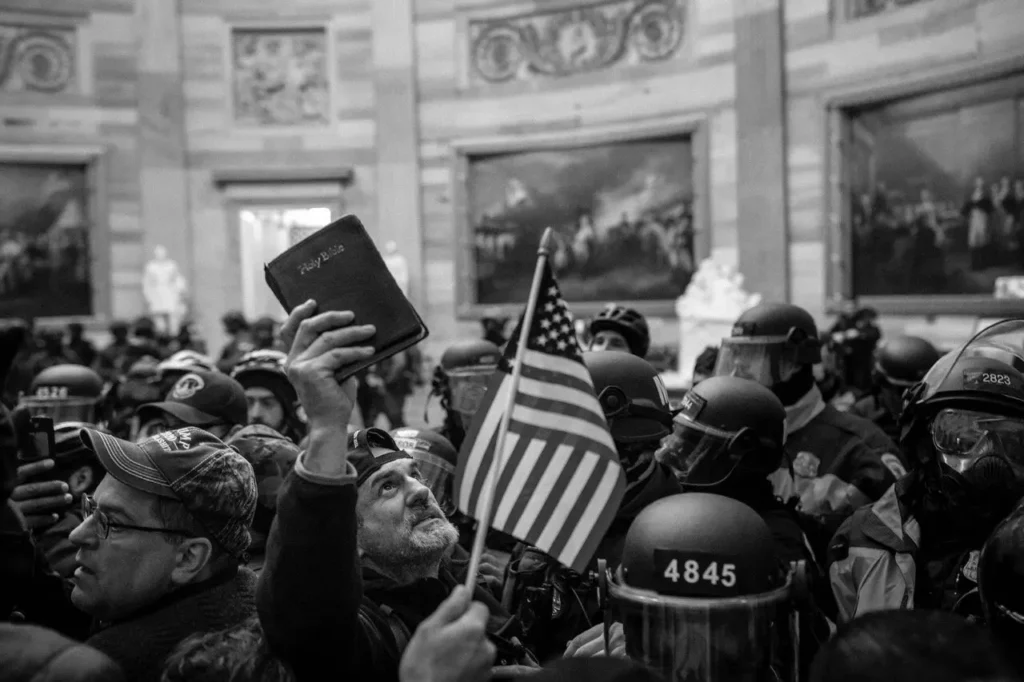The Threat of the GOP’s Christian Nationalism

Image Courtesy of The New York Times
By John Maggio
This is an independently submitted op-ed for our Quill section. Views and statements made in this article do not necessarily reflect the opinions of The Tower.
It must be stated first and foremost that America was not founded to be a Christian nation.
Benjamin Franklin stated that “lighthouses are more useful than churches.” In the Treaty of Tripoli, signed by President John Adams in 1797, America explicitly declares that “the government of the United States of America is not in any sense founded on the Christian Religion.”
The United States has always been a safe haven for religious freedom. The Mayflower Pilgrims escaped England when faced with religious persecution. Many of the American colonies were established as “plantations of religion” for all to worship God as they saw fit, free from being forced to follow the same religion as one’s king or queen. America has always been open to all as a place for the huddled masses yearning to breathe free, with these freedoms, including the freedom of religion, enshrined as the first protected individual right in the Bill of Rights.
But today, American history is being eroded by the Republican Party, both its supporters and elected leaders, in order to write a new telling of our nation’s founding.
Over half of Republicans support or sympathize with the ideals of Christian nationalism. These ideals include the beliefs that all laws should be based on Christian values, that being Christian is a key aspect of being an American, and that God calls upon Christians to exercise their religious doctrine over all areas of American society.
Another poll by the Pew Research Center states that 60% of Americans believe our Founding Fathers intended the United States to be a Christian nation. Of those same Americans who believe that the United States should be a Christian nation, a majority of them hold the belief that the Bible should have more influence over laws than the will of the people.
This belief is not just among the electorate. The Speaker of the House, Representative Mike Johnson (R-LA 4), stated, “the separation of church and state is a misnomer” as it is not from the Constitution but from a letter written by Thomas Jefferson. The former constitutional lawyer is not alone in this line of thinking. Representative Lauren Boebert (R-CO 3) says she is “tired” of this separation too, with conservative hard-line Representative Marjorie Taylor Greene (R-GA 14) boastfully announcing that “we should be Christian Nationalists.”
While this may seem like a few loudmouth officials expressing their religious views, it is a concern when it could become a threat to our system of government.
Speaker Johnson believes that “we don’t live in a democracy” as our founders “followed a biblical admonition.”
With much of the Republican electorate and elected leadership believing in a religious doctrine that calls for the death of homosexuals, those who work on Sunday, and non-Christians (Leviticus 20:13, Exodus 35:1-3, 2 Chronicles 15:12-13) should be the basis of laws in this country, America has lost one of its founding virtues. The early settlers fled from the rule of a state-backed religion to worship in the way that they saw as the right way to have eternal life after death. While our Founding Fathers had many radical ideas for their time, the idea of having a separation between the governing body and a religious order has been one of our most defining ones.
America has never been perfect, but we have always held the principle that we can do better. If a doctrine that was used to justify slavery were the way we decided laws in this country, we would not likely have had the Emancipation Proclamation or the Civil Rights Movement. If a book that states that women are to be submissive and not to teach (1 Timothy 2:11-12) were where we derived American law from, we would likely not have the 19th Amendment or other successes of the 20th-century feminist movement.
When Christians are being persecuted in China, cries to protect them are rightfully called. When Christians are attacked in Pakistan, the nation’s leaders condemn such violence. When the persecution of Christians in the Middle East has been described as “coming close to genocide” by the British government, there are few Christians who would not support the protection of these Middle Eastern Christians. But when it comes to religious minorities in the United States, the members of the Republican Party have seemed to disregard protecting them right here on American soil by explicitly wanting to make this a nation of Christians, by Christians, for Christians.
Throughout American history, our nation has appealed to Christianity. From the national motto of “In God We Trust” to starting sessions of Congress with prayer, Christianity has an established place in American democracy. This does not mean that this nation is a Christian nation, nor should we accept the radical takeover by this movement.







